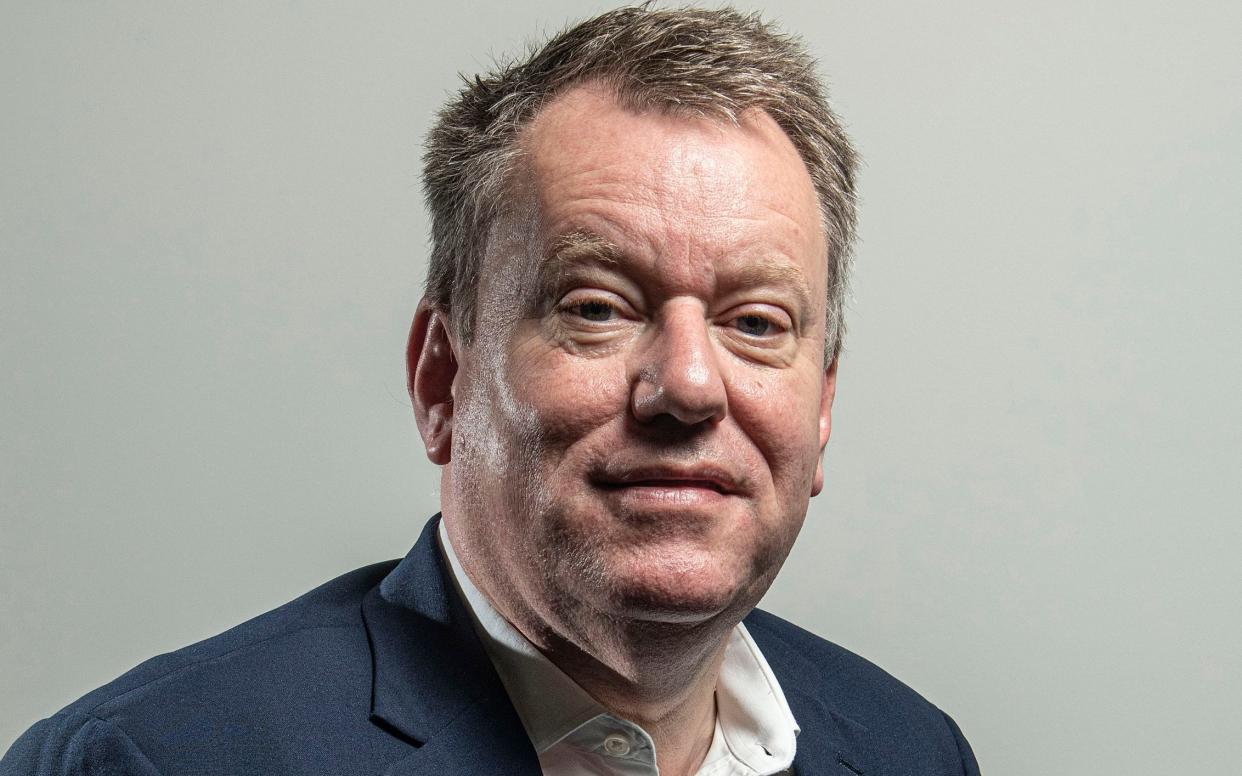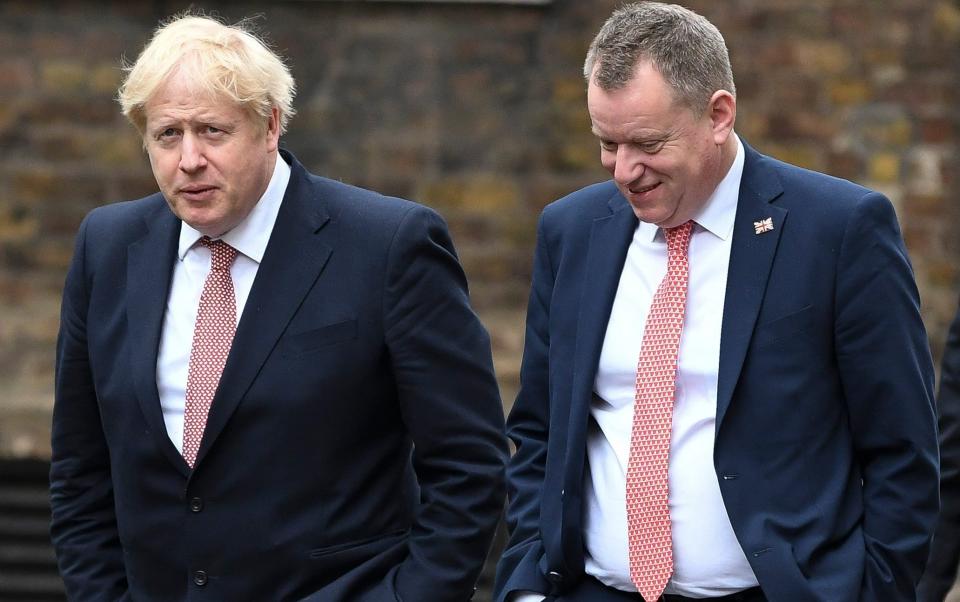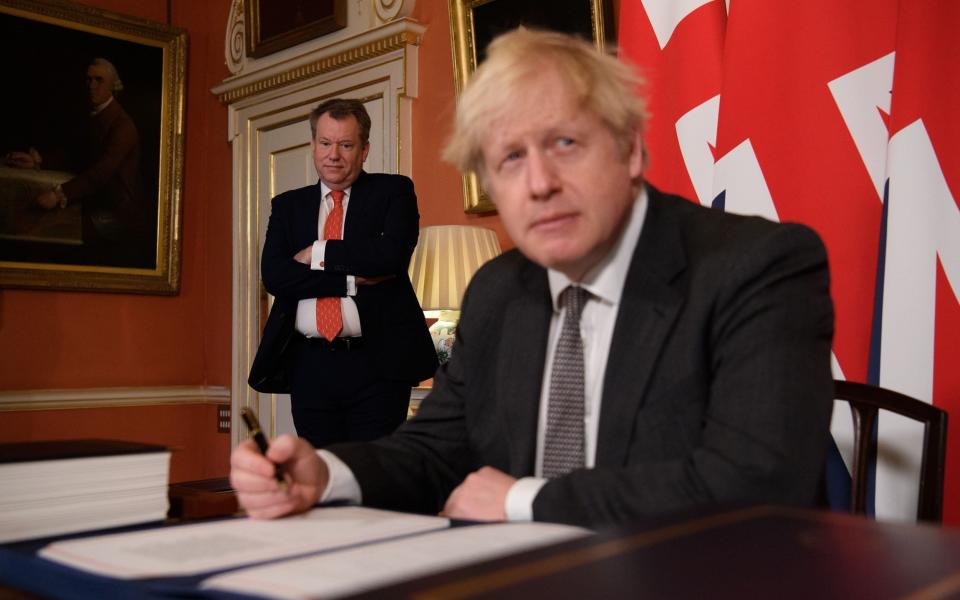Lord Frost: ‘Boris Johnson’s instincts are strong, but he hasn’t been well-served by those near him’

On paper, Baron Frost of Allenton is a paid-up member of the British establishment. After studying history and languages at Oxford, he joined the Foreign Office and rose quickly, holding a string of senior civil service roles before becoming Ambassador to Denmark. Now in the Lords, the 56-year-old is a Privy Counsellor and Companion of the Order of St Michael and St George.
But what’s striking when you meet Lord Frost isn’t so much his intellect and clarity of thought – although he has both in abundance. What really comes across – as he lays out his political credo in his soft, classless voice – is his firm, even instinctive, grasp of the motivations and concerns of millions of ordinary voters, despite his insider status and trappings of high office.
“I was brought up in Derby, and many of my friends and family are still in the East Midlands and the North West,” says Lord Frost. “So I know many classic ‘red wall’ voters who voted Labour all their lives but switched to Boris in 2019. They did so not only to get Brexit done, but in protest at the disdain shown towards them by the establishment over many years.”
And while expressing himself in the low-key, thoughtful manner of the diplomat he once was, Lord Frost also knows how to land a hefty political punch – as he did just before Christmas, when he dramatically resigned from the Government.
A week earlier, Boris Johnson had endured the largest Commons rebellion of his premiership, with around a hundred Tory MPs opposing the Government’s “Plan B” measures to tackle the omicron variant. Then came the Conservatives’ humiliating by-election defeat in North Shropshire, raising further concerns about the Prime Minister’s judgement.
A couple of days later, with questions mounting about the future of Mr Johnson’s premiership, Lord Frost resigned, compounding the sense of chaos at the top of Government. Suddenly, the Prime Minister had lost one of his closest allies, arguably the most widely respected member of his Cabinet.

Until relatively recently, Lord Frost was little known beyond Westminster and Whitehall. But after Mr Johnson appointed him Chief Brexit Negotiator in July 2019, he became a household name. Almost overnight, Lord Frost toughened up the UK’s negotiating stance, before striking an acceptable exit deal with Brussels – so ending a prolonged period of tortuous Parliamentary gridlock. A delighted Johnson ennobled his right-hand man, bringing him into the Cabinet. “He’s the greatest Frost,” quipped Mr Johnson, “since the Great Frost of 1709.”
In his pre-Christmas resignation letter, Lord Frost acknowledged it was Mr Johnson’s “outstanding leadership” that ensured the 2016 Brexit referendum was finally implemented – “a moment of grave constitutional crisis”. He praised the “stunning election victory” the Prime Minister secured in December 2019.
But Lord Frost was quitting the Government, his letter explained, due to “concerns about the current direction of travel”. And now, just weeks on, the Prime Minister’s former confidante is becoming more vocal, spelling out his concerns, urging Mr Johnson to follow a path of “low taxes, free markets and free debate” to revitalise the UK.
“There has always been a battle within the Conservative Party between a free-market, low-tax approach and a more consensual, ‘Macmillanist’ view,” says Lord Frost, in an exclusive interview for the Telegraph's Planet Normal podcast, which you can listen to using the audio player at the top of this article. “I think history shows that the best way of producing prosperity is free markets and encouraging free individuals to pursue their own lives.”
In April, a slew of pre-announced tax increases kicks in, including higher national insurance contributions and a freezing of basic- and higher-rate thresholds. Lord Frost’s opposition to these rises – coinciding as they do with spiralling fuel bills and a broader cost-of-living squeeze – chimes with that of many Tories, at Westminster and beyond.
“I don’t think Conservatives should be raising taxes – and one of the difficult decisions we should have taken is not to do so,” says Lord Frost. “We should be pursuing policies that increase growth, while controlling spending, getting things in order after the massive economic shock of the last couple of years.” The Prime Minister “gets the case for low taxes”, Lord Frost insists. “But you’ve got to have the discipline and willingness to see things through,” he adds – suggesting that, in his view, Mr Johnson does not.
Lord Frost is similarly critical of the Government’s environmental agenda, particularly the “net-zero” commitment to limit carbon emissions by 2050. Again, this is a policy area that worries many Tory backbenchers and party activists as well, given the high levies charged on household and commercial energy bills that are channelled towards renewable energy.
“I accept climate change is a problem – I just don’t think it’s necessarily the most significant problem the country faces at the moment,” says Lord Frost. “And I feel we are rushing at some of this stuff, bringing in unnecessary measures too soon.”
The Government is misguided in “trying to pick winners, backing new energy technologies that are unproven and not necessarily the best way forward, paying out subsidies that are funded by increasing costs on individuals”, he says.
“I know respectable leaders around the world must espouse green politics, and if you don’t you are thought to be a bit dodgy, but I would pace it a bit,” he argues. “People have been sold the view you can do net zero without it really costing anything – and that’s obviously not true.”
But Lord Frost saves his most trenchant criticism for the Government’s handling of the pandemic, confirming he left office due to the latest round of anti-Covid restrictions. “I didn’t agree with the Plan B measures such as masks and vaccine passports. And that’s why I resigned,” he says.
He goes further, arguing that the approach towards pandemics needs to be entirely rethought. “People are going to look back at the last couple of years globally and see lockdown as a pretty serious public policy mistake,” Lord Frost says. “I’d like to see the Government ruling out lockdowns for the future, repealing the legislation, ending them – we can’t afford lockdowns and they don’t work.”
Again, Lord Frost’s words will resonate with many on the Conservative backbenches, who have long argued that ministers have failed to consider a broad enough range of expert advice when making public health decisions and that debate has been shut down.
“We need to stop doing Covid theatre – vaccine passports, masks, stuff that doesn’t work – and focus on what does work, such ventilation, antivirals, proper hospital capacity. That’s what we need to prioritise going forward.”
I ask Lord Frost about the Great Barrington Declaration – the joint statement calling for “focused protection” of the most vulnerable, as opposed to across-the-board lockdown, co-authored in October 2020 by some of the world’s leading epidemiologists, including the University of Oxford’s Professor Sunetra Gupta.
“One of the first things that really began to trouble me was the way the Great Barrington Declaration was dismissed, as if these people were being unreasonable in even suggesting it and didn’t know what they were talking about,” says Lord Frost. “It was wrong to do that – and the authors had a point. For me, that was the first sign something was going wrong in the normal give and take in terms of public debate on this question.”
Lockdowns are “inhuman”, he says, and the Government has been “at fault in not acknowledging contrary evidence” when responding to this pandemic. “There haven’t been enough internal debates, enough voices challenging the epidemiologists, emphasising the economy in an attempt to get to grips with the trade-offs.”
While the Prime Minister’s “own instincts for freedom are very strong”, Lord Frost expresses “frustration” that in managing these problems, “Boris hasn’t allowed these instincts as much rein as he might have”. But he argues also that Mr Johnson “has not been well-served by everyone around him”, reporting he had often seen the Prime Minister “groping for information, and it not being there”.

In Lord Frost’s view, decision-makers at the heart of Government lost sight of some lockdown realities. “The teams managing Covid, in No 10 and elsewhere, were coming into the office and seeing people throughout – they tended to forget what life was like for everybody else,” he says. “I do think that meant we were more ready to reach for lockdown and coercive measures than we might have been in in other circumstances.”
Lord Frost calls for “serious reform” of the civil service and the broader machinery of government. “One thing we’ve learnt from this pandemic is that if the Prime Minister pulls a lever, it didn’t always work,” he says. “We need to think hard about how the civil service recruits, how departments are structured – because the current model isn’t working.”
Another one-time government insider who has argued the same is Dominic Cummings, Mr Johnson’s controversial former chief adviser. Does Lord Frost think Mr Cummings’s exit from Downing Street in November 2020 weakened the administration?
“Actually, I do,” he instantly replies. “I’m a huge admirer of Dom – I don’t agree with him on everything,” Lord Frost says. “But I think his strategic brain, clarity of thought and ability to focus on goals was, and is, really important. He’s not the only person who can do that, but you do need someone to run the No 10 machine effectively, keeping everything in line, and it needs to be done all the time.”
The conversation naturally moves on to “partygate” – and the growing public outrage at social gatherings held within Downing Street at the height of lockdown. Did Lord Frost get the e-mailed invitation in May 2020 to drinks in the No 10 garden to “make the most of the lovely weather”?
“I don’t know anything about the email or the party,” he replies. “I was doing other things. But I totally get why the public is angry – they are right to be.” Lord Frost then falls back the stock defence used by the Government’s remaining ministers, that social events across Whitehall during lockdown are now under official investigation.
“Sue Gray [as Second Permanent Secretary to the Cabinet Office] is looking into this, and there couldn’t be a better person – we need to wait to see what she concludes,” says Lord Frost. It’s a reminder of the huge power still wielded by senior Whitehall figures, with Johnson’s political future now effectively resting in the hands of a senior civil servant.
That brings us to Brexit. Does Lord Frost, himself once a senior Foreign Office mandarin, feel there were people in Whitehall who, during Theresa May’s premiership and since, tried to sabotage Brexit? “I wouldn’t say sabotage,” he replies. “But the intellectual midpoint of the Civil Service was that the European Union is a jolly good thing, and it was very bad that we were leaving – so it took time to get the system in the right place.”
Lord Frost acknowledges, though, that “there was obviously an attempt to stop Brexit after the referendum, with parts of our political establishment working in cooperation with some in the EU to have a second run at it”.
Having famously riled various senior eurocrats, not least his opposite number, the EU’s then chief Brexit negotiator Michel Barnier, how does Lord Frost assess the UK’s current relations with Brussels?
“While I was in those negotiations, I often felt we weren’t being taken seriously, that the EU didn’t look on us as an equal negotiating partner, but as a kind of province or territory in which they expected to exercise exceptional influence, one way or another,” Lord Frost recalls. “That’s not how we saw it – and I wasn’t happy about it.”
For all his diplomatic restraint, Lord Frost lets his guard drop slightly, accusing some EU officials of ongoing bad faith. “I think the atmosphere is gradually improving, as certain people move on,” he says. “But a lot of the EU is invested in Brexit failing.”
That brings us to the last substantial topic of discussion – Northern Ireland, which remains in the European Union’s single market, with the EU insisting on extensive border checks on goods travelling to and from the rest of the UK. That’s caused enormous tension among many unionists, who object strongly to what are seen as EU attempts to break up the country.
Lord Frost considers it “quite shocking” how Brussels has used Northern Ireland’s still-fragile peace as bargaining chip when negotiating the UK’s EU withdrawal, particularly under Theresa May’s premiership. “One of the problems we had when we came in in 2019 is that a lot of the damage had been done, with positions of principle already conceded,” he says. “We were extremely worried we wouldn’t get Brexit at all in any form, so we took the strategic decision to deliver it as quickly as possible, in a way that gives the country free choice about the future.”
Lord Frost points out that under the Northern Ireland Protocol, in contrast with May’s “Irish backstop”, the Northern Ireland Assembly “has the right to vote in four years’ time as to whether or not existing arrangements should continue”.
The Government also has the right to invoke Article 16 of the protocol, ending the agreement. “It definitely has to be a real option for us,” Lord Frost says. “It’s always best to do things by negotiation if you can, but the way the EU is acting now makes no sense and it’s obvious the protocol must be changed significantly or replaced.
“If they insist on the goods moving into Northern Ireland as being like any external border of the EU, then it won’t work,” Lord Frost adds. “That’s not what the protocol was designed to do. If the EU wants a good relationship with us, they should negotiate and put in place something better.”
As the conversation draws to a close, I ask Lord Frost what he makes of Mr Barnier’s recent attempts to contest the French presidential election, campaigning on a platform of restoring sovereign powers and leaving the single market, the precise outcomes he so adamantly opposed for Britain. “I was obviously more persuasive than I thought,” Frost responds with a laugh.
“On a serious note, there are many great nation states in Europe – and France is one of them. And, in the end, the EU is designed so that decisions are taken outside the nation states, beyond democratic control – and you can only push people so far.”
And I end by asking what Lord Frost plans to do with his high public profile. How will he contribute further to national life?
“I never really expected to end up here,” he says with a smile. “There’s a lot of luck in how things have turned out – I was the right person at the right time to help deliver Brexit – and I feel really honoured for that.
“What I’ve got to do now is to keep saying what I think,” he says. “Because there are a lot of people in this country who think like me.”
Liam Halligan is the Economics and Business Editor of GB News
Listen to Lord Frost’s interview on Planet Normal, a weekly Telegraph podcast with Liam Halligan and fellow Telegraph columnist, Allison Pearson, using the audio player at the top of this article or on Apple Podcasts, Spotify or your preferred podcast app.

 Yahoo News
Yahoo News 
